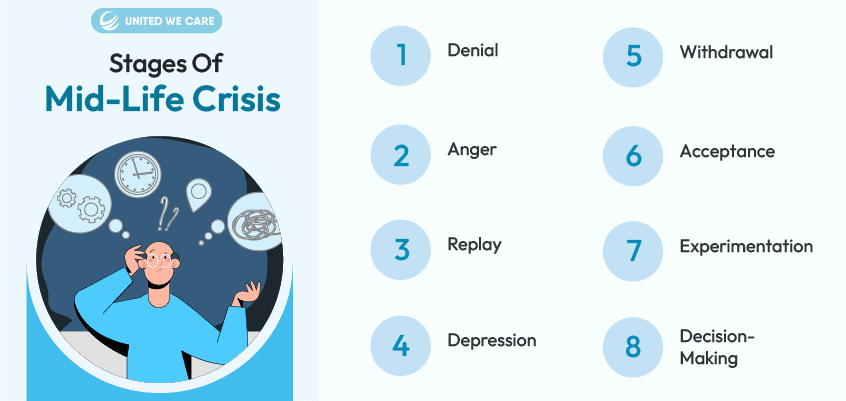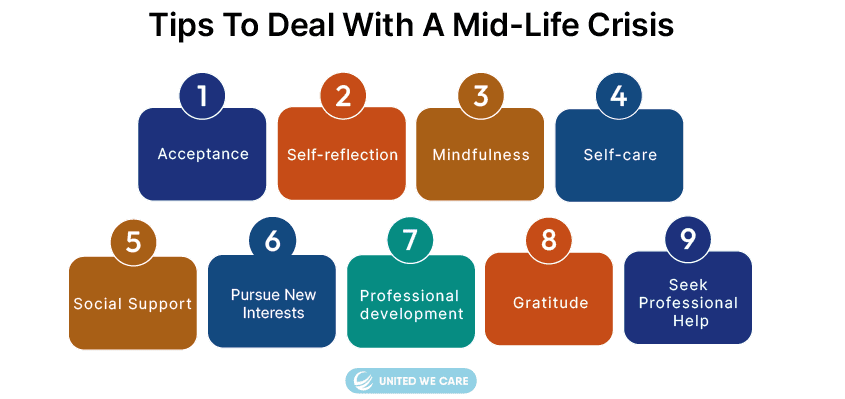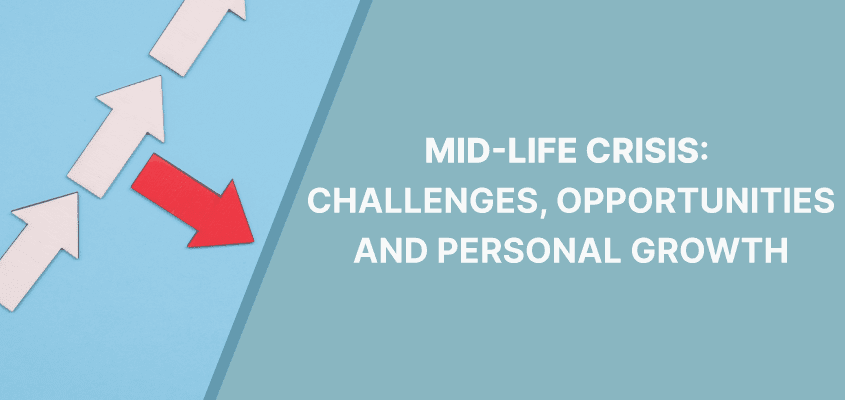Introduction
Are you between the ages of 35 and 60? Do you feel like you are not where you should have been in life? Not everyone goes through a mid-life crisis, but those who do, end up feeling quite dissatisfied and disappointed with life. It becomes a period of self-reflection and making big changes. If you are facing a mid-life crisis, through this article, let me help you understand what you can do to overcome these feelings and thoughts that you’re experiencing.
“What horrifies me most is the idea of being useless: well-educated, brilliantly promising, and fading out into an indifferent middle age.” – Sylvia Plath [1]
Understanding Mid-Life Crisis
When we become an adult, we all kind of have everything planned in our heads where, by 21 we should have completed our professional degrees, by 25 we should be well-settled in a job, by 30 we should be arrived with at least one kid, and by 35 we should be living the life of our dreams with a happy and loving family. And by 60, we should be ready to retire in style with all the luxuries in life.
Sounds like a dream life for those between the ages of 35 and 60, doesn’t it? For some, this might be a reality. For many, it starts seeming like a more and more distant dream, professionally, personally, or both.
Jerrold Lee defines mid-life as the time when people sit back and say, “Well, now that I’m all grown up, what do I want to be? [2]” This period can be filled with dissatisfaction, confusion, anxiety, and a feeling of being directionless.
You might feel suffocated and trapped in your life if you are going through a mid-life crisis. Due to this, you might end up making some reckless decisions just to give meaning to your life.
Factors That Contribute to Mid-Life Crisis
Since not everyone between the ages of 35 to 60 years would go through a mid-life crisis, there are no definitive factors that contribute to this phase. But it could happen because of a life-changing event, like the death of a loved one, retirement, divorce, etc. Other factors could be feeling that your life is not going as per you, losing time on achieving personal goals, or you’re bored of the monotonous life of going to the office and coming back home.
A mid-life crisis can also occur when you’re worried about aging and health going down, maybe after seeing a wrinkle or grey hair.
Reaching mid-life can feel like time and life are both running out. You might become hyper-aware of the fact that anything can happen tomorrow. So, you might feel like making as many changes as possible, whether or not they would be helpful. In fact, these decisions and changes can make you feel even more unstable in life and add to your anxiety and fears.
Stages of Mid-Life Crisis
Although a mid-life crisis can look different for different people, there are three responses you can have to this phase [3] [4]:
- The thought of ‘getting older’ triggers an anxious response. It can be a significant birthday, the death of someone close, a switch in career, or anything that may force you to think about your age or life.
- During the mid-life crisis, you may examine varied identities, redefine close relationships, or look for new sources to provide a better life meaning. Dr. Guttman called it “Ego Mastery.”
- You may find a resolution through therapy. It may help you recognize that you are living through a typical and expected phase of life. You might find support when you are reoriented or redirected toward life.

A mid-life crisis might take a few weeks to a couple of years to resolve. These could be the possible stages of mid-life crises: [5]
- Denial: At the onset, you might attempt to fight or deny that you are growing older.
- Anger: Once the acceptance starts to fall in place, you might start feeling enraged about the challenges of mid-life or about your incompetence in managing those challenges.
- Replay: You may try to recount the aspects of your youth that you found most appealing by having cosmetic surgery, having an illicit relationship, or slacking off your responsibilities.
- Depression: Depressive and anxious feelings might settle in when replaying seems not to be helping you.
- Withdrawal: You might want space from your loved ones to handle your symptoms of depression and anxiety.
- Acceptance: You might start acknowledging that you’re aging and would want to explore life’s meaning and purpose.
- Experimentation: You might think that experimenting with new experiences, hobbies, or relationships can help you. It may involve taking risks or looking for unique experiences to break out of your routine.
- Decision-making: Eventually, you may start to make more significant changes in your life. You could look into shifting careers, ending a relationship, or even changing cities or countries. You may feel a sense of urgency to make these changes before it’s too late.
Signs of a Mid-Life Crisis
The signs of a mid-life crisis differ for everyone. However, here are some general symptoms you could look into [6]:
- You might start feeling increasingly restless or bored and have a desire for change or newness.
- You might have a sense of dissatisfaction with your career, relationships, or lifestyle.
- You might feel anxious about aging, death, or the future.
- You might feel less interested in activities that earlier used to be fun.
- You might notice changes in appetite, sleep patterns, or energy levels.
- You might have started taking more risks than usual, such as impulsive purchases or substance abuse.
- You might start facing relationship problems, such as infidelity or divorce.
- You might think and do too much about looks, young age, or physical fitness.
- You may be able to notice that you get irritable or moody very quickly and even have feelings of depression.
- You may have a desire to reassess your values, priorities, and life goals.
You may notice that these signs can very easily be confused as symptoms of depression. Understanding the differences can help with the correct identification.
| Depression | Mid-Life Crisis |
| A mental health mood disorder characterized by persistent sadness, loss of interest, and hopelessness. | Although not a diagnosable medical or psychiatric condition, it is a period of doubt, anxiety, and inner turmoil in middle age. |
| There is no age barrier for people diagnosed with depression, whether children, teenagers, or adults. | Indicators emerge in median age. |
| Triggered by an amalgamation of biological, psychological, and social factors. | It stems from a person’s re-evaluation of the purpose of their life. |
| Repetitive patterns or severity of symptoms may arise. | Feelings of impending doom and dissatisfaction might be a recognizable pattern |
| Medication, therapy, and lifestyle changes can be the possible treatment. | When a person starts feeling more at peace with their path in life, the symptoms may lessen. |
Tips to Deal with a Mid-Life Crisis
As much as you might feel that dealing with a mid-life crisis is the end of the world, it’s not. You can overcome this phase by following these tips [8]:

Tip 1- Acceptance: You need to begin by acknowledging and accepting that you are going through a mid-life crisis. Remember that it’s a normal part of the aging process. We all will turn 35 to 60 at some point. So, you don’t have to take it so harshly.
Tip 2- Self-Reflection: Just spend some time with yourself and think about your values, goals, and purpose. Try understanding what you are feeling and why you’re feeling negative.
Tip 3- Mindfulness: You might have heard of the famous dialogue from the movie ‘Kung Fu Panda,’ “Yesterday is history, tomorrow is a mystery, and today is a gift. That’s why they call it present.” So, try being in the present moment. A great way to do that is by practicing mindfulness, where you have to do everything with 100% attention on the task at hand.
Tip 4- Self-Care: Mid-life ages can become crises when you start taking care of everything except yourself. So, start prioritizing self-care. You can indulge in exercising, sleeping on time, eating healthy, taking out time for hobbies, etc. That way, you can even achieve a work-life balance.
Tip 5- Social Support: At the end of the day, when you can share your thoughts and experiences with someone, you might be able to let go easily. In that case, you focus on more important things in a better manner rather than focusing on things that are getting out of control. So, talk to family, friends, colleagues, etc., and get all the support you need.
Tip 6- Pursue New Interests: You can always try doing something you’ve been thinking about doing for the longest time. Pick up a new hobby or activity that brings you joy and fulfillment. Take risks that don’t harm you or the people around you.
Tip 7- Professional Development: If you have something exciting to look forward to, you are less likely to reach a crisis phase. So, figure out some learning opportunities where you can upgrade your skills. That way, you can expand your career opportunities and enhance your sense of purpose.
Tip 8- Gratitude: Whatever challenges life might have thrown at you, there’s always something to be grateful about. So, look at the positive things that happened in your life and focus on them rather than on things that did not go right.
Tip 9- Seek professional help: You must realize you don’t have to handle everything alone. So, if things seem to be getting out of hand, you can take help from a mental health professional. They can really help you understand the endless opportunities you can explore and even teach you certain skills that might be helpful for the rest of your life.
CONCLUSION
We all will go through the ages of 35 to 60 years, the middle age as they call it. However, some of us might take it more seriously and harshly than the rest. You might see a wrinkle one day or a grey hair, and you might just break down, evaluating where time has gone and how much more you need to do. But that’s life. It’s not the end of the world to be going through this crisis. Just take one day at a time, think about what would be the changes that can make you happy, and try some new things in life. Give life a chance.
If you are facing a mid-life crisis, reach out to our mental health experts at United We Care! At United We Care, a team of wellness professionals and mental health experts will guide you with the best methods for well-being.
REFERENCES
[1] S. Plath, “A quote from The Unabridged Journals of Sylvia Plath,” Goodreads.com. [Online]. Available: https://www.goodreads.com/quotes/551731-what-horrifies-me-most-is-the-idea-of-being-useless. [Accessed: 10-May-2023]
[2]A. Petersen, “The Virtuous Midlife Crisis,” WSJ. https://www.wsj.com/articles/the-virtuous-midlife-crisis-11578830400
[3]“Therapy for Midlife Crisis, Therapist for Midlife Crisis,” Therapy for Midlife Crisis, Therapist for Midlife Crisis, Sep. 15, 2009.
https://www.goodtherapy.org/learn-about-therapy/issues/midlife-crisis
[4] R. Martin and H. Prosen, “Mid-life Crisis: Growth or Stagnation,” PubMed Central (PMC). https://www.ncbi.nlm.nih.gov/pmc/articles/PMC2370750/
[5] “Midlife Crisis: Signs, Causes And Treatments,” Forbes Health, Aug. 11, 2022. https://www.forbes.com/health/mind/midlife-crisis/
[6] F. J. Infurna, D. Gerstorf, and M. E. Lachman, “Midlife in the 2020s: Opportunities and Challenges,” PubMed Central (PMC). https://www.ncbi.nlm.nih.gov/pmc/articles/PMC7347230/
[7] www.ETHospitalityWorld.com, “Midlife crisis: Embracing change for self-transformation – ET HospitalityWorld,” ETHospitalityWorld.com. https://hospitality.economictimes.indiatimes.com/news/speaking-heads/midlife-crisis-embracing-change-for-self-transformation/97636428
[8] A. Petersen, “‘I Refocused on Living a Life With Purpose’: Readers Share Their Stories of Midlife Crisis,” WSJ, Apr. 02, 2023. https://www.wsj.com/articles/i-refocused-on-living-a-life-with-purpose-readers-share-their-stories-of-midlife-crisis-11579708284





